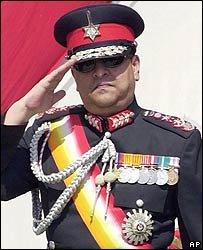Options Narrow For Nepal's King

BBC Nepali service
April 12, 2006
By Rabindra Mishra
The current countrywide protests against King Gyanendra's direct rule in Nepal are the clearest sign so far of his weakening authority.
Protesters come from different walks of life - including doctors, engineers, lawyers, journalists, government employees and teachers - meaning that the king's rule is no longer an issue left in the hands of politicians alone.
It will be difficult now for the royalists to continue arguing that there is no support for the campaign waged against the king by the country's seven major political parties.
Many, including sections of the international community, gave the king the benefit of the doubt when he seized direct power in February 2005.
However, his gamble seems to have backfired, both at home and abroad.
In a statement issued on Monday, the US state department said King Gyanendra's direct palace rule had "failed in every regard".
'Silent king'
Immediately after ascending the throne in June 2001, after his brother Birendra and entire family were killed by the then crown prince, King Gyanendra sought to make his future role clear.
He said he would not be a silent king like his brother, who agreed to be a constitutional monarch following a people's uprising in 1990.
King Gyanendra extensively toured the country giving speeches about making people the first priority in politics.
In one speech, in the mid-western town of Nepalganj in February 2004, he famously said the "days of monarchy being seen but not heard... are over".
In the speech, he used the word "people" 27 times and talked passionately about their "tears".
A day later, a commentator in Nepal's leading daily, Kantipur, questioned the king's motives.
If the king was so pained by the people's suffering, the commentator asked, why couldn't he establish a charitable trust in memory of his brother using the massive assets that he had inherited after the palace massacre?
Why had he also approved a nearly six-fold increase in the royal household budget and added luxury cars to the palace's fleet of limousines?
People also began to question the king's political intentions as his words did not match his actions.
While he emphasised the need to restore democracy, he consolidated his absolute authority through various appointments, ordinances and acts of political suppression.
He despised political parties and branded Maoist rebels as terrorists.
Foreign opposition
With regard to the international community, he tried to impress upon it that his takeover was necessary because political parties had failed to deal with the terrorism Nepal had been facing for several years.
Hardly anyone trusted him. The United States, Britain and India responded by stopping the supply of arms to the Royal Nepalese Army. Many other countries suspended several aid commitments.
All of them have been critical of the king and have urged him to reconcile with political parties to resolve the country's deepening crisis.
Among the key players in Nepalese affairs, neighbouring China was an exception. It said the royal takeover was Nepal's internal matter.
But China, too, seems to have changed its position of late.
State Councillor Tang Jiaxuan, who visited Kathmandu in March, was the highest-ranking foreign official to travel to Nepal since the king seized power.
Despite being a guest of honour of the government, Mr Tang made a point of meeting opposition leaders.
Prior to his departure, he spoke of the need for reconciliation between the king and the political parties.
China's change in stance means that the king's hope of playing off China against India - as his father did in the 1960s - is bound to be doomed.
'Obstacle to peace'
When the king sized power in February 2005, he asked for three years to restore peace and democracy in the country.
Despite displeasure at his action, many people waited to see some positive moves from a man whom they viewed as both shrewd and sharp.
However, 14 months on there is a growing feeling that the king is becoming the biggest obstacle to restoring peace and democracy in Nepal.
On Monday, a senior cabinet minister confided to the BBC on condition of anonymity that almost half the cabinet were pressing the king for reconciliation with political parties.
That demand was reflected in a statement, also issued on Monday, by the party of one senior minister, Keshar Bahadur Bista.
The idea of a republican Nepal has become stronger by the day since the royal coup.
There is also a growing feeling among many monarchists that King Gyanendra has done more harm to the institution of monarchy in one year than the Maoist rebels could have done in 10.
The failure to deliver, growing lack of trust, deepening political crisis, widening public resentment and increasing international isolation suggest that King Gyanendra will ultimately have no choice but to seek reconciliation - until or unless he decides to go down the path of ruthless dictators and risk his throne.
© BBC MMVI
The failure to deliver, growing lack of trust, deepening political crisis, widening public resentment and increasing international isolation suggest that King Gyanendra will ultimately have no choice but to seek reconciliation - until or unless he decides to go down the path of ruthless dictators and risk his throne.
© BBC MMVI

0 Comments:
Post a Comment
<< Home